Sponsor:
School of Economics, Wuhan University of Technology (WHU)
Hubei Science and Technology Innovation & Economic Development Research Center (STIED)
Date:
June 15, 2016
Location:
Lecture Hall, Room 1606, Jian 4 Teaching Building, WUT
Theme:
New Incentives ▪ New Model ▪ New Economy
|
Speaker |
Introduction |
Topic |
Reviewer |
|
Jean-Louis MUCCHIELLI |
Professor, University of Paris 1 Panthéon Sorbonne (France) |
Chinese OFDI In EUROPE --Determinants and new challenges |
|
|
Yoshiteru Nakamori |
Professor, Japan Advanced Institute of Science and Technology (Japan) |
Decision-Making by Integrating Analytical and Synthetic Thinking |
|
|
Didier Delaval |
Professor of Business, Bordeaux Business School (France) |
Experiencing modern management techniques for organizations changes in a disrupted global economy. A global approach for multicultural SMEs |
|
|
Liu Qianqiu |
Professor of Finance, University of Hawaii (USA) |
Momentum is Really Short-term Momentum |
Xiao Mingjun |
|
Wei Ping |
Associate Professor, Business School of Central South University |
Financial Constraints, Director Networks and Cross-border Mergers and Acquisitions: Evidence from China |
Liu Pingfeng |
|
Xiao Mingjun |
Assistant Professor, Wuhan University |
Mechanism Design with Interdependent Valuations and Semi- exclusive Information |
Liu Qianqiu |
|
Liu Pingfeng |
Associate Professor, School of Economics, WUT |
New economy driven by internet technologies: transformation in infrastructure, factors of production and social division of labor |
|
|
Sesay Brima |
Ph.D Candidate, School of Economics, WUT |
Does National System of Innovation Spurs Economic Growth in BRICS Economies? Evidence from Panel Data |
Taurai Muvunza |
|
Taurai Muvunza |
Master Candidate, School of Economics, WUT |
Challenges underlying service sector development in China’s innovation driven growth |
Pan Maomao |
|
Pan Maomao |
Ph.D Candidate, School of Economics, WUT |
Spatial Effect of the Convergence between Manufacturing and Information Industry in China |
Sesay Brima |
|
Robert R. Reitano |
Professor of the Practice of Finance, Brandeis University (USA) |
Managing Yield Curve Risk for Banks and Insurers |
Jin Yinghua |
|
Jin Yinghua |
Doctor, School of Economics, Zhongnan University of Economics and Law |
Did FDI Really Cause Chinese Economic Growth? A Meta-analysis |
Yu Qian |
|
Yu Qian |
Professor, School of Economics, WUT |
Option game analysis for R&D investment and cooperation of enterprises based on risk dominance |
Shi Dan |
|
R.M.Kapila T.R. |
Ph.D Candidate, School of Economics, WUT |
A New Hybrid Statistical Approach for Stock Market Forecasting: A case study on Colombo Stock Exchange |
Pan An |
|
Pan An |
Ph.D Candidate, School of Economics, WUT |
China’ carbon reduction initiatives: A new driving force for growth |
Song Yiru |
|
Tong Bo |
Master, Boston University |
How should an industrial transformation suit us? |
Qu Xiangyu |
|
Song Yiru |
Ph.D Candidate, School of Economics, WUT |
An Empirical Study On Relative price Change and Technology of New Energy Industry |
Cheng Yang |
|
Cheng Yang |
Master Candidate School of Economics, WUT |
Regional comparison study on measurement of National High-Tech Zone's innovation efficiency in China—from a perspective on innovation value chain |
R.M.Kapila T.R. |
Conference Abstract
Under the background of Economic globalization, the New Economy, which is driven by IT revolution and led by Hi-tech Industries, and which includes essential components such as Internet Plus, advanced manufacturing industry, new energy, new materials and new commercial forms, is elevated to an unprecedented strategic level by Chinese government. It will become a significant thought and development path adapting to and leading to the “New Normal” of Chinese economy. Various government policies and enterprise strategies will be inclined to new incentives, new industry and new model. New Economy becomes a hot topic generally concerned by government, enterprises and academy nowadays.
In order to discuss the connotations and trends of New Economy, explore the motivation, organization, model and government policy, as well as enhance exchange among experts and scholars, the 3rd. Innovation and Global Industrial Development Forum & International Symposium on “New Incentives, New Model and New Economy” is going to be held on June 15th, 2016 by School of Economics of Wuhan University of Technology and Hubei Provincial Research Center for Scientific &Technological Innovation and Economic Development(STIED).
Section Ⅰ Opening Ceremony
(1)Oration of Leader of WUT:Dr. Zeng Chunnian (Professor, Vice-president, WUT).
On June 15th, 2016, Professor, Zeng Chunnian, vice President of our school, delivered a speech on behalf of our school. President Zeng expressed his warm welcome and heartfelt thanks to the foreign professors and hoped that all the students present could benefit from the BBS. Finally, he wished the international academic seminar a complete success.

(2)Speech of Chair man :Dr. Wei Long (Professor, Dean of SoE, and Director of STIED)
On June 15th, 2016, Professor Wei Long, dean of the school of economics and director of STIED, delivered the opening speech. After expressing his gratitude to the experts, scholars and students, he announced the opening of the third international academic seminar on innovation and global industrial development BBS and "new power, new model and new economy".
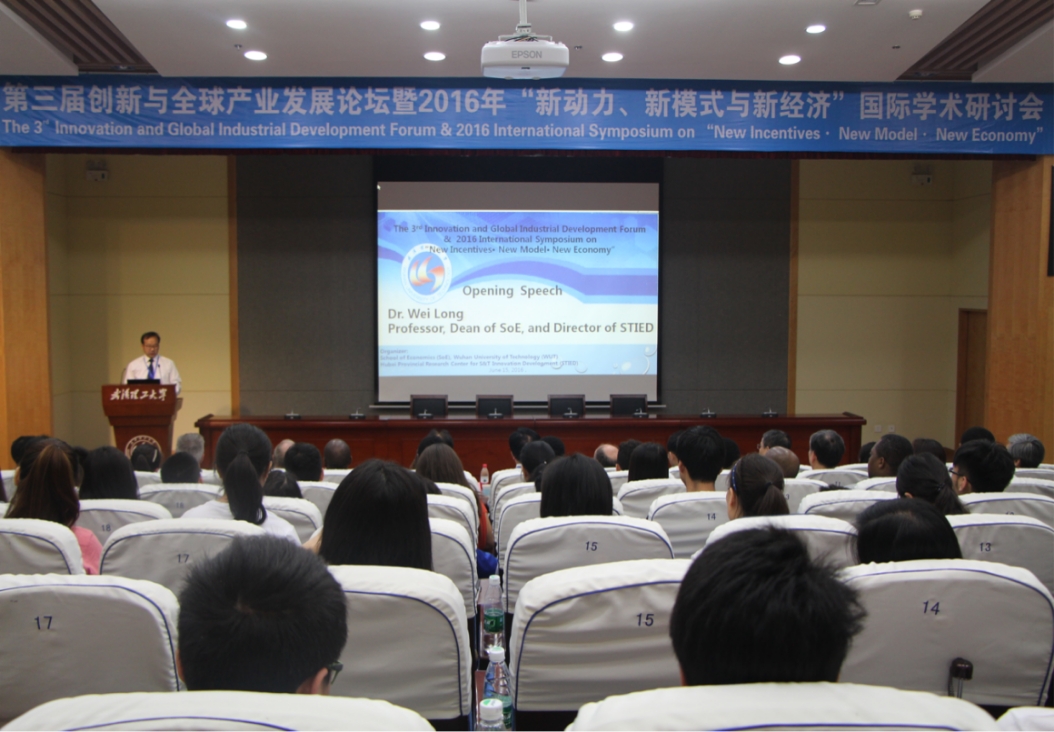
Section II Main Session
(1)Jean-Louis MUCCHIELLI, Professor of Economics, School of Economics, University of Paris 1, Panthéon Sorbonne, France.
On June 15th, 2016, Professor jean-louis MUCCHIELLI gave a talk on "Chinese outbound direct investment in Europe: determinants and new challenges". The new era of China's first wave of capital has begun and this is accelerating China’s impact on Europe,' he said. 'Chinese companies are at the forefront of innovation in several industries, and the new growth model that emphasizes innovation and intellectual property protection will further accelerate this process.' Therefore, the success of Chinese multinationals will depend on the ability to cooperate with internal clusters. Professor MUCCHIELLI's funny speech drew fierce applause.
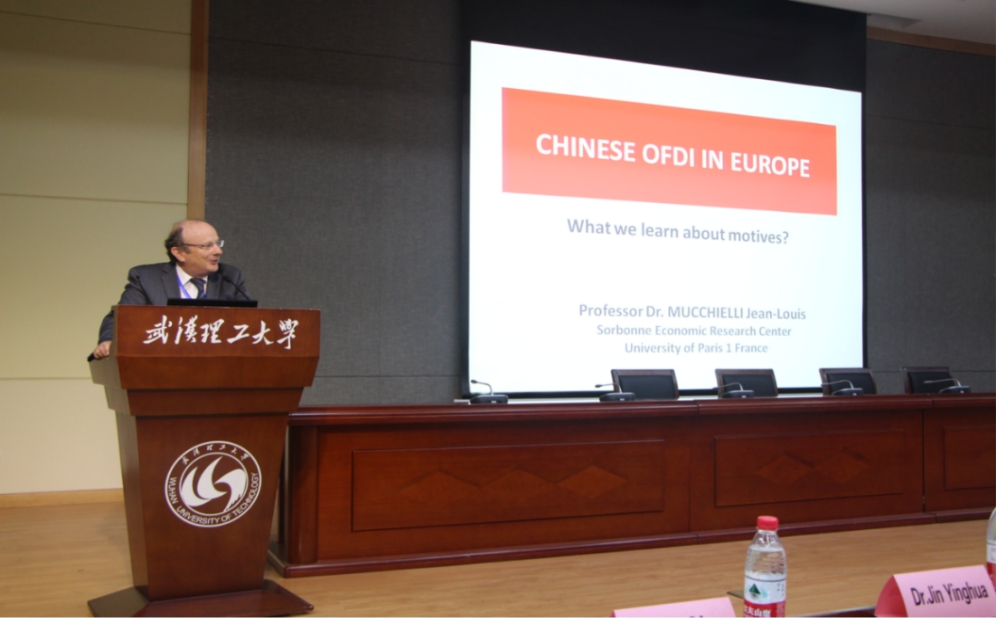
(2)Yoshiteru Nakamori, Professor of Japan Advanced Institute of Science and Technology.
On June 15th, 2016, Professor Yoshiteru Nakamori gave a lecture on Models and Principles of Knowledge Creation and Justification. He introduced a new discipline "knowledge science" from different perspectives, such as the mission of knowledge science, the characteristics of knowledge involved in this discipline and the difference between it and information science.
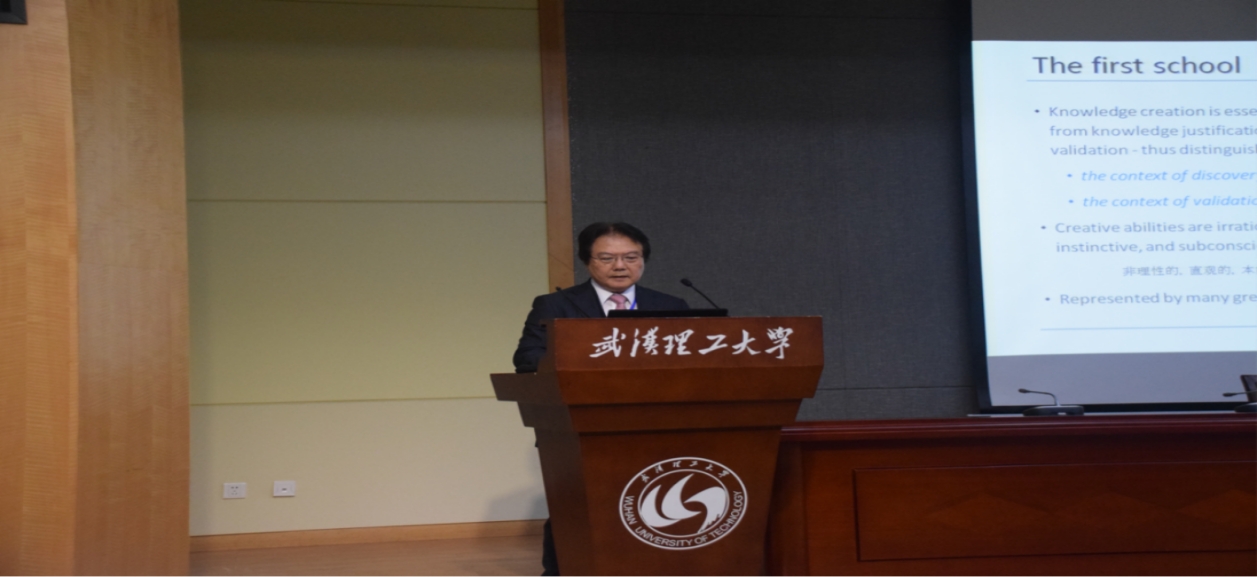
(3)Didier Delaval, Professor of Business, Bordeaux Business School (France).
On June 15th, 2016, Professor Didier Delevla gave a lecture titled "Experiencing modern management techniques for organizations changes in a disrupted global economy. A global approach for multicultural SMEs". He described modern management techniques for experiencing organizational change in a chaotic global economy and the globalized approach of multicultural small and medium-sized enterprises, and analyzed how global corporate strategies were endangered by the chaotic economy. New business models that challenge the status quo should be focused, he said, and the importance of emerging smes operating across cultures and developing through collective learning should be highlighted.
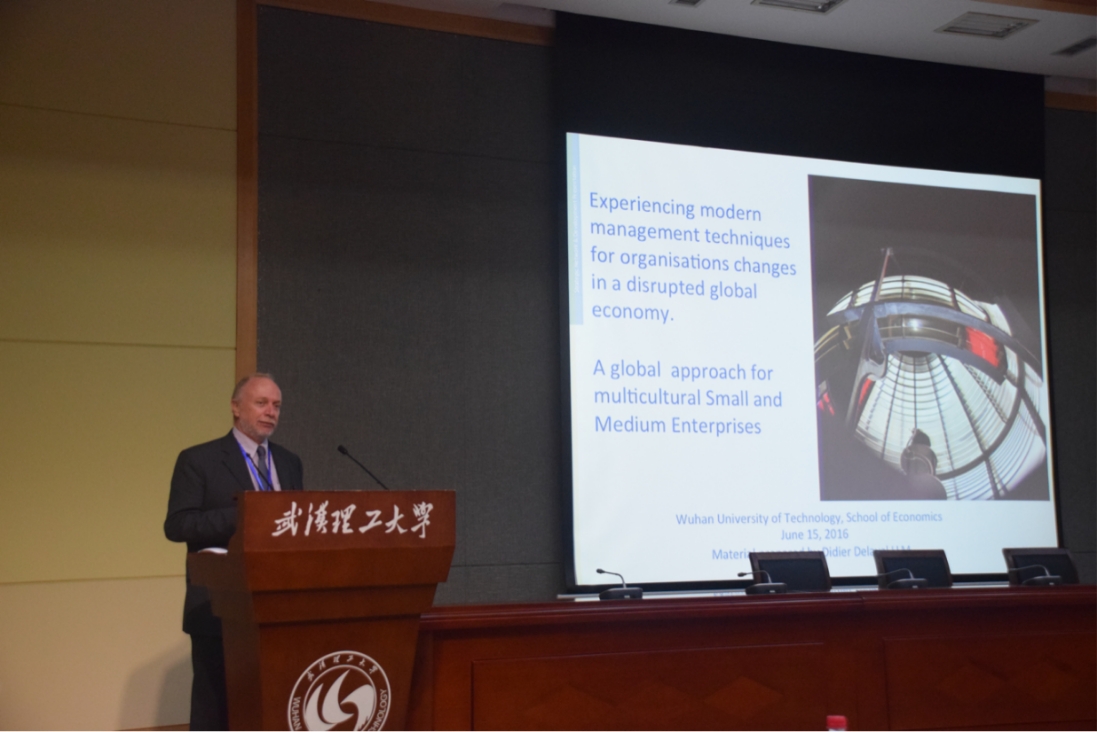
Section Ⅲ Session of Industrial Economy
(1)Liu Qianqiu,Professor of Finance, University of Hawaii (USA).
On June 15th, 2016, Prof. Liu Qianqiu delivered an academic report titled Momentum is Really Short-term Momentum in the meeting room of the School of Economics on the 16th floor, teaching building Jian 4, which was hosted by Dr. Wang Fang (Associate Professor, Duty director of STIED). All those findings have contributed new and direct evidences to understanding the role of social networks in international businesses.

(2)Wei Ping, Associate Professor of Business School of Central South University.
On June 15th, 2016, Prof. Liu Qianqiu delivered an academic report titled Financial Constraints, Director Networks and Cross-border Mergers and Acquisitions: Evidence from China in the meeting room of the School of Economics on the 16th floor, teaching building Jian 4, which was hosted by Dr. Wang Fang (Associate Professor, Duty director of STIED). All those findings have contributed new and direct evidences to understanding the role of social networks in international businesses.

(3)Liu Pingfeng, Associate Professor of School of Economics, WUT.
On June 15th, 2016, Liu Pingfeng of the School of Economics of Wuhan University of Technology, withed the title “New economy driven by internet technologies: transformation in infrastructure, factors of production and social division of labor” in the meeting room of the School of Economics on the 16th floor, teaching building Jian 4. This report described the transformation in economic development from three aspects: infrastructure, product elements and social division of labor.
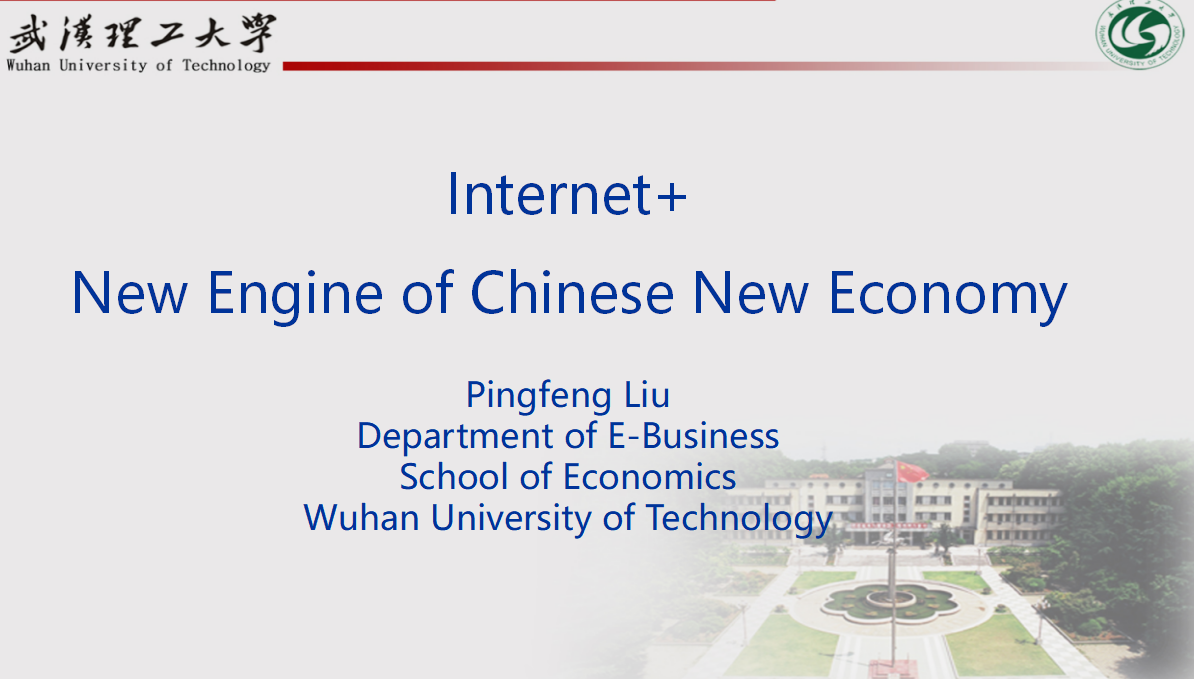
(4)Sesay Brima, Ph.D Candidate of School of Economics, WUT.
On June 15st, 2016, Sesay Brima delivered a presentation titled Does National System of Innovation Spur Economic Growth in BRICS Economies? Evidence from Panel Data: in the meeting room of the School of Economics on the 16th floor, teaching building Jian 4.

(5)Taurai Muvunza, Master Candidate of School of Economics, WUT.
On June 15th, 2016,Taurai Muvunza delivered an academic report titled Challenges underlying service sector development in China’s innovation driven growth in the meeting room of the School of Economics on the 16th floor, teaching building Jian 4, which was hosted by Dr. Wang Fang (Associate Professor, Duty director of STIED). The analysis presented in this paper is useful for decision making and future research to understand the impact of service sector’s industries individually as classified in GATS on trade and sustainable economic development.
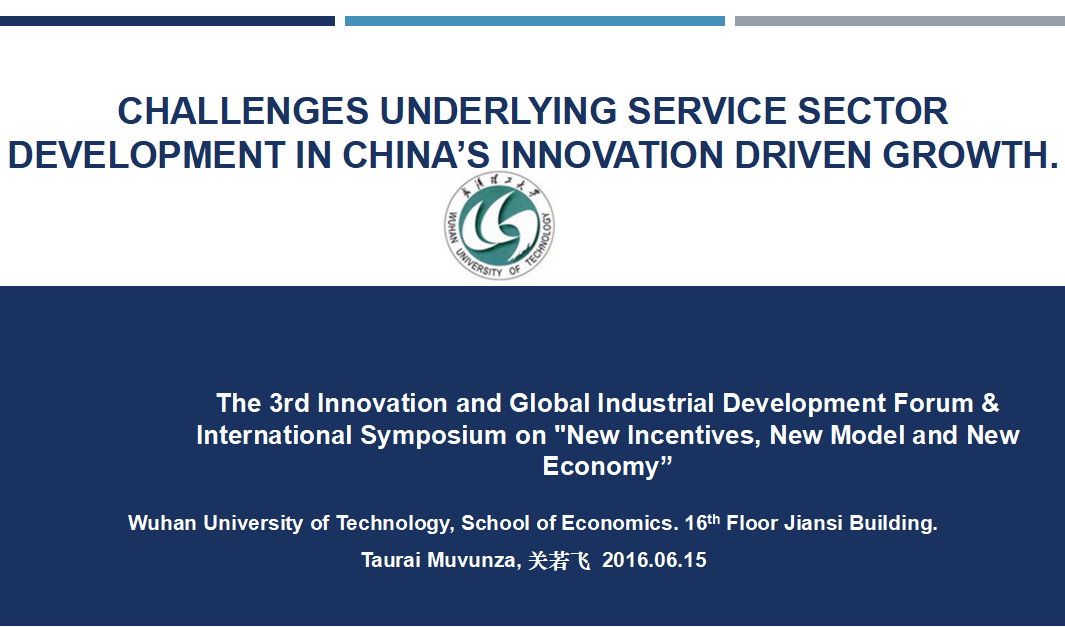
(6)Pan Maomao,Ph.D Candidate, School of Economics, WUT.
On June 15, 2016, Pan Maomao, presented a report titled "Spatial Effect of the Convergence between Manufacturing and Information Industry in China " in room of the School of Economics on the 16th floor, teaching building Jian 4, Conference Center, Wuhan University of Technology.
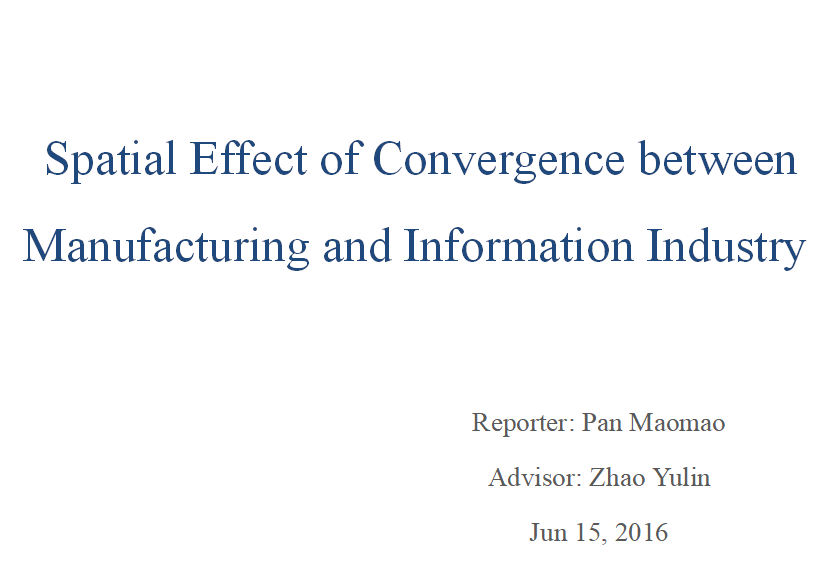
Section Ⅳ Session of Financial Innovation
(1)Robert R. Reitano, Professor of the Practice of Finance, Brandeis University (USA).
On June 15, 2016, Robert R. Reitano of Finance, Brandeis University, withed the title “Managing Yield Curve Risk for Banks and Insurers”. Professor Reitano discussed interest rate risk associated with banks and insurance companies issuing liabilities with interest rate guarantees, and funding these guarantees with diversified bond portfolios.
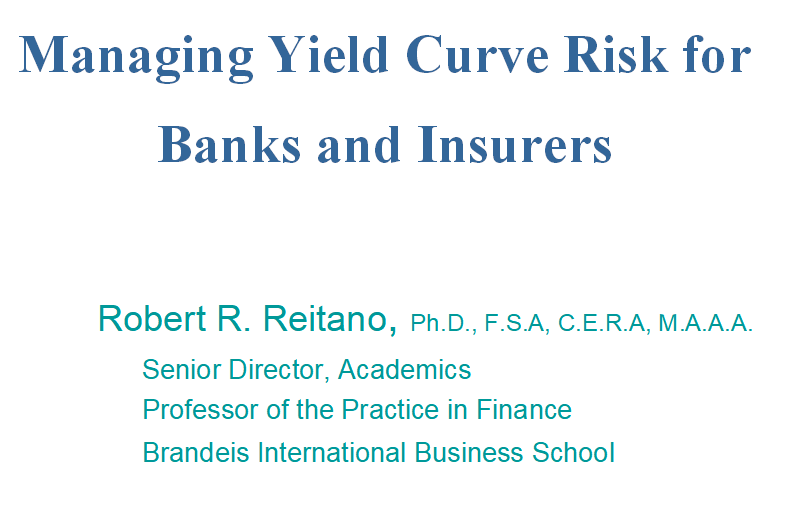
(2)Jin Yinghua,Doctor, School of Economics, Zhongnan University of Economics and Law.
On June 15, 2016, Jin Yinghua, presented an academic report titled "Did FDI Really Cause Chinese Economic Growth? A Meta-analysis". This study performed a meta-analysis of research that estimated the relationship between FDI and Chinese economic growth. Their results suggested that the effect was not inflated by endogeneity, nor impacted by publication bias. However, the positive effect was found to be smaller for more recent and better designed studies.
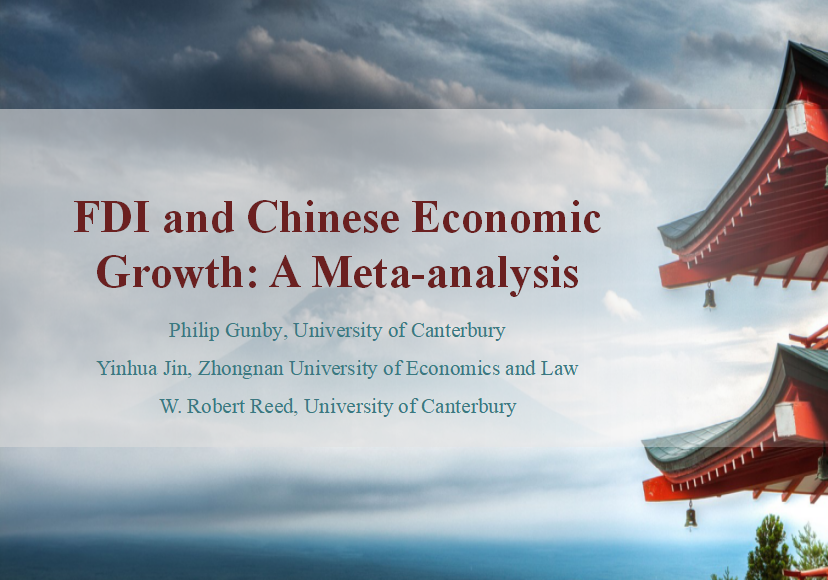
(3)Yu Qian,Professor, School of Economics, WUT.
On June 15th, 2016, Professor Yu Qian gave a lecture titled "Option game analysis for R&D investment and cooperation of enterprises based on risk dominance". The optimal investment time and cooperation strategy of R&D investment under uncertainty are important issues for the R&D enterprises. This paper proposed an option game model for the two symmetrical R&D investment enterprises which will interact with the competitor on continuous time by investing and cooperating.

(4)R.M.Kapila T.R.Ph.D Candidate, School of Economics, WUT.
On June 15, 2016, R.M.Kapila T.R.,withed the title “A New Hybrid Statistical Approach for Stock Market Forecasting: A case study on Colombo Stock Exchange. The main purpose of this study was to propose a new hybrid statistical approach for stock market forecasting to assist investors as well as stock brokers to predict the future behaviors.

(5)Pan An,Ph.D Candidate, School of Economics, WUT.
On June 15, 2016, Pan An, presented an academic report titled "China’ carbon reduction initiatives: A new driving force for growth ".According to the result of structural decomposition analysis (SDA), this study found that composition effect had the positive to the growth of embodied carbon emission in export, which means the industrial or trade structure had negative effect on carbon reduction in China. Besides, the technique effect turned to be the negative effect than expected. Combining the above SDA results and the three characteristics of “New Normal”, this study finally proposed that China’s carbon reduction initiatives ought to target at high quality or green growth with the double negative effects from both composition effect and technique effect.

(6)Tong Bo,Master, Boston University.
On June 10th, 2018, Tong Bo delivered an academic report titled How should an industrial transformation suit us? in the meeting room of the School of Economics on the 16th floor, teaching building Jian 4, which was hosted by Dr. Shi Dan (Associate Professor, SoE, WUT).
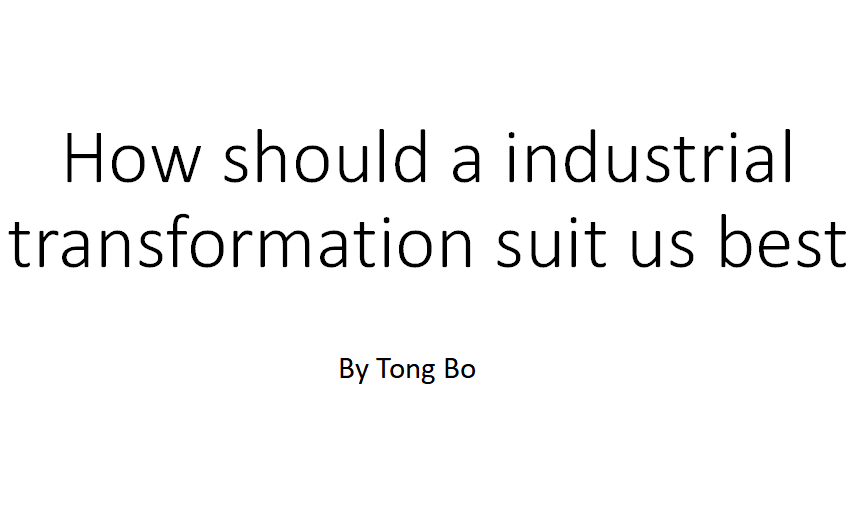
(7)Song Yiru,Ph.D Candidate, School of Economics, WUT.
On June 15st, 2016, Song Yiru delivered a presentation titled An Empirical Study On Relative price Change and Technology of New Energy Industry in the meeting room of the School of Economics on the 16th floor, teaching building Jian 4. Industrial technology and market factors have different ways to influence the development of new energy industry (NEI). Using stock prices of NEI, this paper investigated the dependent structures and synergies between these factors' stock data and NEI’s via Copula-GARCH model. Besides, it compared the heterogeneous structures between Chinese and global NEI, so as to provide suggestions for China’s NEI development.

(8)Cheng Yang,Master Candidate School of Economics, WUT.
On June 15th, 2016, Cheng Yang delivered an academic report titled Regional comparison study on measurement of National High-Tech Zone's innovation efficiency in China—from a perspective on innovation value chain in the meeting room of the School of Economics on the 16th floor, teaching building Jian 4. Based on theory of innovation value chain, at first, this research innovatively divided the industry innovation process into three stages, namely technology research and development, product development and product sales.
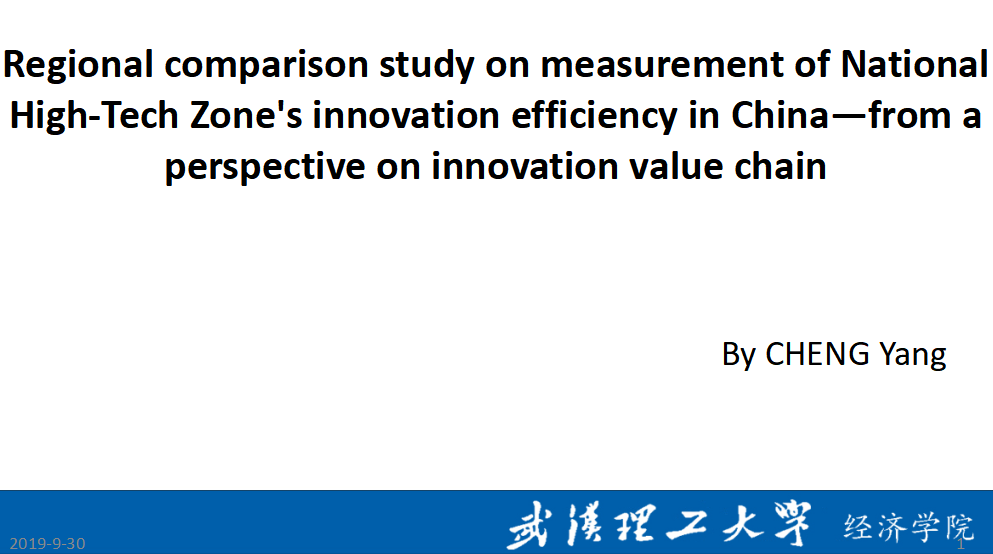
Conclusion
On June 15, the third innovation and global industrial development BBS and the international academic seminar "new power, new model and new economy", sponsored by the school of economics and Hubei scientific and technological innovation and economic development research center (STIED), was held in two halls in Jiansi teaching building. Among them, the academic lecture hall of the school of economics on the 16th floor held discussions on industrial economy, while the MPA case room on the 7th floor held discussions on financial innovation. Many famous professors and doctoral students from the University Of Hawaii, Wichita State University, Brandeis University, Boston University, WuHan University, Central South University, Central South University Of Economics And Law, and Wuhan University Of Technology gave lectures on the theme of "new power, new model and new economy". The two sessions were presided over by associate professor wang fang, deputy director of STIED, and associate professor Shi Dan, school of economics.
The forum was compact and rich in content, focusing on Chinese and foreign politics, and is forward-looking, bringing an academic feast to the participants.So far, in a strong academic discussion atmosphere, the third innovation and global industrial development BBS and "new power, new model and new economy" international academic seminar officially concluded.

